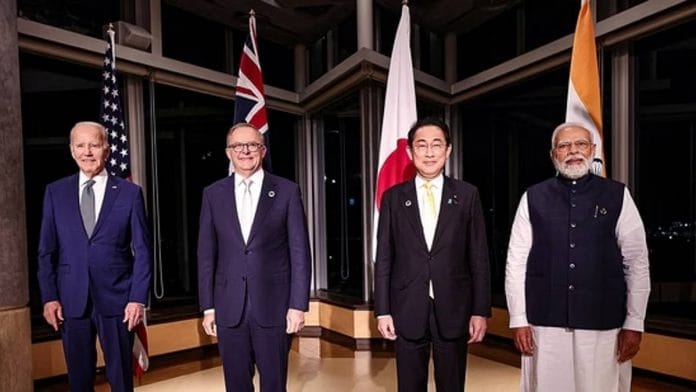New Delhi: On the sidelines of the G7 Summit in Japan, leaders of the Quad released a joint statement Saturday which addressed climate change in the Indo-Pacific region, for the first time referenced “debt burdens” and sought for the region to be free of domination.
This is the third such joint statement issued by leaders from India, the US, Australia and Japan since the first Quad Leaders’ Summit was held in 2021. India is set to host the next Quad summit in 2024.
“We seek a region where no country dominates and no country is dominated…,” stated the latest joint document.
“We aim to ensure the investments we support are fit for purpose, demand driven and responsive to countries’ needs, and do not impose unsustainable debt burdens,” it added.
This comes after an Associated Press analysis found that a dozen countries most indebted to China — including Indo-Pacific nations like Laos and Mongolia — are on the brink of economic collapse due to their inability to pay back Beijing.
In a first, the Quad Leaders’ Joint Statement 2023 also opposed attempts to “undermine the integrity” of the United Nations (UN).
The Quad has now launched at least six new joint initiatives across sectors like energy supply chains, private sector investments, space technology, health, cable connectivity and telecom.
The Quad Leaders’ Summit 2023 was initially scheduled to be held in Australia but due to US President Joe Biden’s inability to travel to the country due to domestic issues, leaders of the country decided to meet on the sidelines of the G7 Summit in Hiroshima, Japan.
Also Read: Who are India’s friends & foes? Modi govt is caught in a messy US-China-Russia-Pakistan…
Opposed to ‘force, coercion’ in Indo-Pacific
Without naming any one country, the joint statement opposed the use of force or coercion in the Indo-Pacific region.
“We strongly oppose destabilising or unilateral actions that seek to change the status quo by force or coercion,” stated the document.
This comes as India and China continue to be engaged in a border stand-off in Ladakh. Recent weeks have also seen fresh tensions between China and the Philippines over a strategic waterway.
Previous joint statements called for deeper cooperation between the US, India, Australia and Japan in multilateral agencies but this year’s specifically opposed attempts by countries to weaken the integrity of the UN.
“We will work collectively to address attempts to unilaterally undermine the integrity of the UN, its Charter and its agencies,” stated the document.
Ukraine war and nuclear weapons
The joint statement saw all four Quad leaders express “deep concern” over the war in Ukraine, and echoed Prime Minister Narendra Modi’s remark to Russian President Vladimir Putin last year that this was not a time for war.
“We express our deep concern over the war raging in Ukraine and mourn its terrible and tragic humanitarian consequences,” said the document.
“We concur that the use, or threat of use, of nuclear weapons is serious and inadmissible,” it added.
There have been reports that Russia is planning to deploy nuclear weapons in Belarus.
Nuclear deterrence has over the last few days also featured prominently in the G7 Summit that is taking place in Hiroshima — a Japanese city on which the US had detonated atomic bombs during World War 2.
Focus on climate crisis
Unlike the Quad Leaders’ Joint Statement 2022, which featured the climate crisis lower down, this year’s document began describing its agenda with a pledge to take “significant action” on climate change in the Indo-Pacific region.
“We recognise the urgent need to address the climate crisis, which poses tremendous environmental, social, and economic challenges for our region,” stated the document.
Quad leaders also decided to expand their vaccine partnership into a broader “Quad Health Security Partnership” that seeks to detect and respond to outbreaks of diseases of epidemic and pandemic potential.
Activities would include disease surveillance and electronic health information systems.
The statement also criticised North Korea’s recent missile launches.
It further called for “full implementation” of the ASEAN Five-Point Consensus peace plan in Myanmar.
Earlier this month, Indonesian President Joko Widodo, ASEAN leader, had expressed disappointment over the peace plan, stating that Southeast Asian nations had made “no significant progress” on implementing it in Myanmar.
Clean energy and economic collaborations
The Quad leaders, in their statement, referenced the Indo-Pacific Economic Framework for Prosperity (IPEF) while pledging to seek meaningful outcomes for the clean economy transition in the Indo-Pacific.
“We will work together to seek meaningful outcomes on climate action and the clean economy transition in the Indo-Pacific Economic Framework for Prosperity,” said the statement.
The IPEF is an economic initiative launched by the US President in May last year which includes 14 member countries. It covers four pillars: trade; supply chains; clean economy; and fair economy; and India has notably signed on to all except trade.
The Quad’s joint statement also launched an R&D programme titled ‘Clean Energy Supply Chains initiative’ in order to enhance “regional energy security”.
(Edited by Nida Fatima Siddiqui)
Also Read: India must prepare for these 3 wars before tackling China, Pakistan threat






